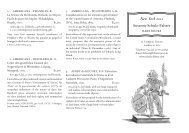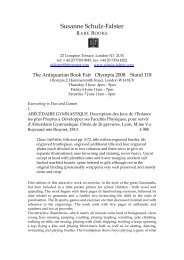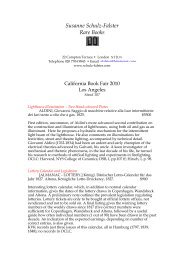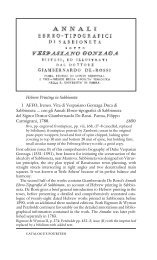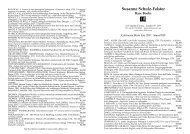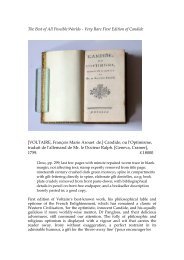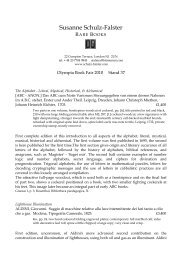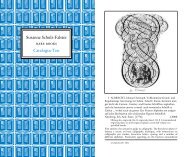Catalogue Number 12 - Susanne Schulz-Falster
Catalogue Number 12 - Susanne Schulz-Falster
Catalogue Number 12 - Susanne Schulz-Falster
You also want an ePaper? Increase the reach of your titles
YUMPU automatically turns print PDFs into web optimized ePapers that Google loves.
struction (triangular, oval etc.), their reach and strength, how to reduce<br />
smoke and soot, lighting-up times depending on the time of year and<br />
phases of the moon. In a detailed table ‘lighting up’ times are outlined,<br />
which allow for a calculation of the number of hours streetlights would<br />
have to be used per year. He gives extensive comparative examples of the<br />
use, shape and form of streetlights in diVerent European cities, and even<br />
mentions streetlighting in China.<br />
In the second chapter Marperger outlines how street lighting needs to be<br />
administered, the manpower needed, and the hierarchy amongst oYcials,<br />
and their control. The third chapter deals with the question of Wnancing,<br />
either as part of the city responsibilities and payable out of local taxes, or<br />
individual streetlights supported by local benefactors, or, ingeniously as a<br />
business proposal Wnanced by an entrepreneur, who then leases them back<br />
to the city for a fee or rent, which is payable out of taxes. Other suggestions<br />
include a local lottery, funding through the harvest of common lands, a<br />
special tax of Jews active in the city, etc.<br />
A Wnal chapter deals with the illumination of ships and lighthouses, with<br />
detailed reference to naval legislation and custom. He concludes with a few<br />
anecdotes of famous lighthouses.<br />
Paul Jacob Marperger (1656–1730) is generally regarded as the founder<br />
of German business literature. After a career as a merchant during which he<br />
travelled all over Europe he became privy councillor at the Saxon court, and<br />
wrote dozens of technical studies and handbooks of diVerent branches of<br />
industry (Kress Library report of 1984–86).<br />
Goldsmiths’–Kress 6117.1.<br />
The Foundation of Communist Russia<br />
51 MARX, Karl. ��������, ������� ������������ ��������<br />
[Kapital, Kritika Poleticeskoj Ekonomii]. [Translated by Lopatine<br />
and Danielson]. Volume one, St. Petersburg, Poliakof, 1872. £8000<br />
Tall 8vo, pp. xiii, [ii], 678; bound without the half title, faint circular<br />
ink stains to title, with show-through to dedication and Wrst signature;<br />
title page a little creased and reinforced in gutter; loss of a few letters to<br />
verso of last leaf, presumably caused by careless removal of original<br />
wrappers; nineteenth century green cloth, recased, extremities a little<br />
rubbed; a good copy.<br />
First edition in Russian of Marx’s Kapital, in fact the Wrst translation to be<br />
published at all. Its publication led Marx to remark: ‘our success is still<br />
greater in Russia, where Kapital is read and appreciated more than anywhere<br />
else’ (PMM 359).<br />
The publication of the Wrst volume of Karl Marx’s Das Kapital was the<br />
result of a quarter of a century of economic studies, mostly carried out in<br />
the Reading Room of the British Museum. His biting critique of the capitalist<br />
system had developed from his previous publication Zur Kritik der<br />
politischen Ökonomie, 1859. Das Kapital contained it all, from the theories of<br />
susanne schulz-falster rare books catalogue twelve<br />
value and surplus value, through the dictatorship of the proletariat to the<br />
neo-Hegelian dialectic of materialism, the major Marxist contribution to<br />
the interpretation of history and political economy. The Wrst volume was<br />
the only one to be completed and to be published within Marx’s lifetime.<br />
‘The great scientiWc achievement of Marx lies ... in the details and yet more<br />
in the method and principles of his investigations in his philosophy of history.<br />
Here he has, as is now generally admitted, broken new ground and<br />
opened new ways and outlooks. Nobody before him had so clearly shown<br />
the role of the productive agencies in historical evolution; nobody so masterfully<br />
exhibited their great determining inXuence on the form and ideologies<br />
of social organisms. The passages and chapters dealing with this subject<br />
form ... the crowning parts of his work. If he has been justly compared with<br />
Darwin, it is in these respects that he ranks with the great genius’ (Encyclopaedia<br />
Britannica.)<br />
‘By an odd quirk of history the Wrst foreign translation of Das Kapital to<br />
appear was the Russian, which Petersburgers found in their bookshops<br />
early in April 1872. Giving his imprimatur, the censor, one Skuratov, had<br />
written ‘few people in Russia will read it, and still fewer will understand it.’<br />
He was wrong: the edition of three thousand sold out quickly; and in 1880<br />
Marx was writing to his friend F. A. Sorge that “our success is still greater in<br />
Russia, where Kapital is read and appreciated more than anywhere<br />
else”’(PMM 359).<br />
The printing of another edition in Russia was forbidden and so in 1890 a<br />
second Russian edition was printed in New York. This second edition was<br />
identical to the Wrst but for two small typographical variations: the misplaced<br />
comma opposite p. 73 in the table of contents is replaced by a full<br />
stop; and the e at the end of l. 40 of p. 65 is replaced by c. The present copy<br />
is clearly the Wrst edition.<br />
Printing and the Mind of Man 359; Rubel 33; Mehring, Marx 391; Die Erstdrucke<br />
der Werke v. Marx u. Engels, 1955, S. 33.





